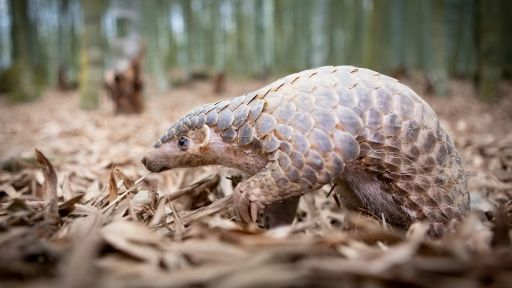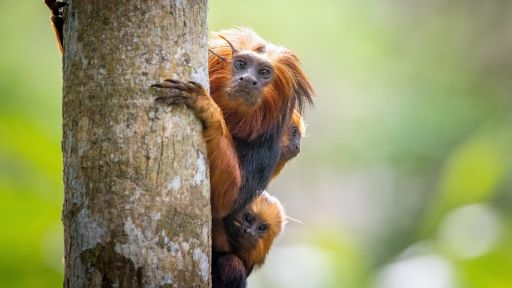The Big Little Journeys team works with conservationists to follow the journeys of two endangered animals as they navigate a world transformed by humans. A rescued pangolin in Taiwan is given a new chance back in the wild, whilst scientists using radio collars follow a family of Golden-headed lion tamarins, with newborns, through Brazil’s Atlantic forest. The team meets local people who are working to protect these two species and the forests in which they live. Narrated by Aaron Pierre.
Features



(air whooshing) - [Narrator] To film tiny animals, "Big Little Journeys" needed the help of scientists and local people working at the forefront of conservation.
- Wow.
- Oh wow.
- [Narrator] In Taiwan, the team work with Dr. Nick Sun, who has tracked critically endangered pangolins for the past decade.
- When she walks away.
- Yes.
- Okay.
- Okay.
- [Narrator] Nick gives the team an opportunity to get a pangolin's eye view of the world, and it's one that's full of danger.
- [Narrator] Globally, 300,000 pangolins are poached every year for their meat and scales.
Only in Taiwan is their population stable, but they still face very real threats.
- [Paul] Pangolins are animals that I've wanted to film for years, and then you come to a rescue center and you see the reality.
- [Narrator] But it's not all bad news.
Nick is preparing to release a young rescued male.
His return to the wild gives the team an opportunity to closely film the behavior of this elusive species.
To monitor the progress of released individuals, Nick and his team conduct regular examinations.
- There's friends in rescue center that are giving these charming, rare, incredible animals a chance in nature.
And I think we all should be very, very pleased that people like Nick are out there fighting to protect the natural world.
- [Narrator] The camera crew are preparing to film the pangolin's first steps back into the wild.
(speaking in foreign language) (pangolin sniffing) (dramatic synth music) (Nick speaking in foreign language) (dramatic synth music) - [Narrator] 11,000 miles away in Brazil, the team are filming an animal harder to follow.
A family of golden headed lion tamarinds.
- They really go when they want to.
Like for them, they're not traveling far, they're just jumping between trees.
But for the crew, we are walking up and down very steep slopes, very tangled terrain.
- They're super small for a primate and very fast.
You have to imagine the face of a tamarind is maybe the size of a polar bear's nose.
So keeping that in focus while they're moving is very tricky.
- [Narrator] Keeping up with them is only possible because of the work of conservationist, Joanison Vicente and his team who are using radio colors to track their movements.
(speaking in foreign language) - [Narrator] 88% of the Atlantic forest has been cut down, so understanding how lion tamarind's travel is essential for their conservation.
(animals calling) (leaves rattling) - [Elsa] It's been little journeys for them.
They're just pinging across the top of the trees.
They've kept us on our toes.
- Come on, let's follow.
(leaves rattling) - [Narrator] In Taiwan, the team are filming in a thick bamboo forest.
- I'm hoping the pangolin isn't just gonna run away from us because it's quite difficult to move around in here.
(leaves rattling) (orchestral music) - [Team Member] We've just gotta work really calmly 'cause we can't startle him.
If we do, he'll just roll up into a ball.
- [Narrator] It's not just working at the pangolin's pace that makes filming a challenge, it's also the weather.
(thunder rumbling) - It's a bit soggy now.
I'm feeling a bit soggy now.
- Don't worry.
- We only have a very narrow period of time where it's light enough to film and the pangolin is awake.
(raining pouring) (birds chirping) - [Narrator] In Brazil, the lion tamarinds lead the team to a kabruka.
Here, local farmers use traditional techniques to grow shade loving crops whilst preserving the natural habitat for wildlife.
But Joanison has other ambitions.
(synth music) (speaking in foreign language) (animals calling) (dramatic synth music) - [Narrator] As the lion tamarins settle into their new home, the team switched to remote controlled cameras.
(dramatic orchestral music) - Each night they're coming back to sleep in tree hollows.
We've found that most nights they're sleeping in the same one, but sometimes they do catch us out.
- [Narrator] With the support of local communities, the future is looking brighter for golden headed lion tamarinds.
(calming ambient music) (air whooshing) In Taiwan, the team's time filming pangolins is coming to an end.
(dramatic synth music) But by using camera traps and attaching a tag, Nick can continue to monitor his behavior.
(dramatic synth music) (speaking in foreign language) - [Narrator] Pangolins are the most trafficked mammal on earth, so every release is a victory.
- There is hope for many of these endangered species.
All it needs, passionate people who wanna make a difference.
(speaks in foreign language) - Bye bye.
- There's people like Nick that are really helping to ensure that these amazing creatures live out here in the world that they belong in.
So yeah, it's amazing to see.
(dramatic orchestral music) (leaves rattling)
